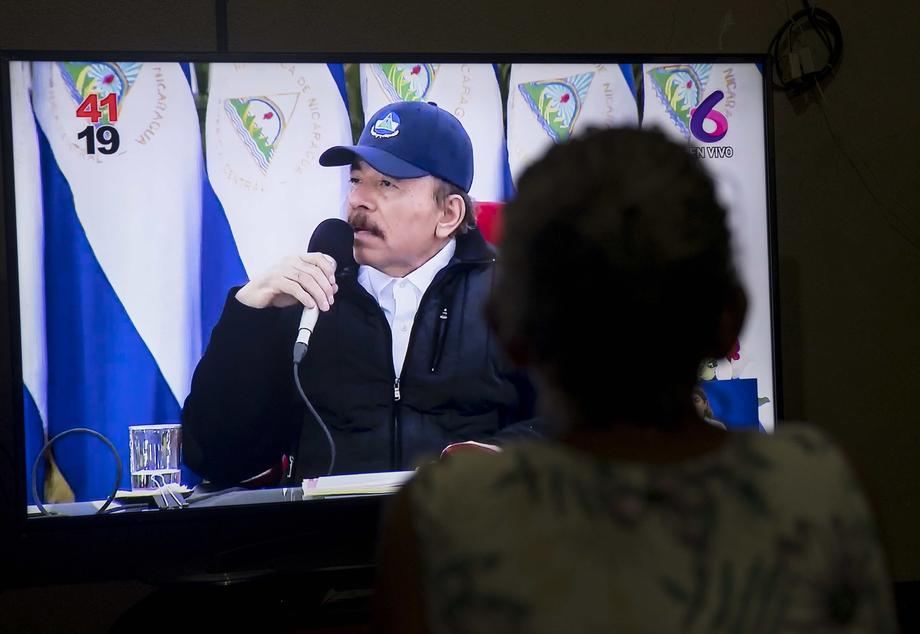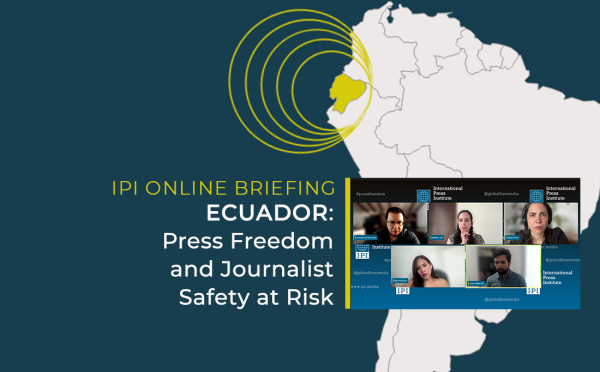On September 28, representatives of Nicaraguan President Daniel Ortega’s authoritarian regime unveiled a draft cybercrime law that would introduce an array of new crimes that would seriously undermine press freedom. Nicaraguan journalists view the proposals as a response to critical reporting on the government’s handling of the coronavirus pandemic as well as its abuse of power and corruption.
Article 30 of the so-called “Special Cybercrime Law”, popularly known as the “gag law”, threatens to jail anyone who spreads “false or distorted” information that produces “alarm or fear” with two to four years in prison. The draft article also foresees up to three years in prison for false information that damages a person’s “honour” or reputation and up to five years for false information that “incites hate or violates, jeoparadizes economic stability, public order, public health or sovereign security”.
Moreover, the law would punish “illegally intercepting any type of written communication” with up to three years in jail.
The introduction of the draft follows leaks of data from Nicaragua’s health ministry that exposed discrepancies in numbers on coronavirus infectiosn presented by the government.
The following day, Ortega approved the ‘National Cybersecurity Strategy’, which “guarantees the sovereign, secure, and trustworthy use of the cyber-space” and serves to protect “information and services to the general population”. Nicaraguan press organizations, like the Nicaraguan Independent Journalists and Communicators (PCIN), and independent journalists have since spoken out against the draft law and the cybersecurity strategy, which they believe are intended to silence the press and expand government censorship to online and social media.
Julio López, a journalist and member of PCIN, told IPI, “We are in a situation that criminalizes the journalistic practice in Nicaragua. This cybersecurity law, which penalizes false news, really penalizes any form of work that involves the defence of human rights, as, under a dictatorship, this is considered criminal”.
Moreover, the same month, the ruling Sandinista National Liberation Front proposed the “Foreign Agents Regulation Law”, which would force every individual or organization receiving foreign funding to register accordingly with the Interior Ministry and undergo financial checks. Various human rights and media organisations have voiced their concerns, arguing that this would threaten their work. Similar “foreign agent” laws have been passed in other repressive countries, most notably in Russia.
López said that the law also “criminalizes the work of independent journalists who receive any type of international funding”.
RESTRICTIONS ON COVID-19 DATA
It is no coincidence that such legal measures have been taken in the midst of a global pandemic. Lopez said that the laws were reprisals against the independent media for its pivotal role in informing the people about the virus.
“Journalists and human rights defenders are objects of criminalization for revealing information that the regime wants to conceal”, he told IPI. “It was ultimately the hard work of media workers and journalists that unmasked the regime’s concealment of important information in preserving the health of the Nicaraguan people. It was thanks to independent journalists’ reporting that citizens began taking their own measures against the pandemic, such as wearing masks or going into self-quarantine. The regime itself never declared quarantine to be mandatory.”
He added that such cybersecurity laws were proposed because the government realized that something had slipped out of its control with regards to the pandemic. The proposed laws, according to Lopez, were not intended to battle “fake news”, as the “best example of fake news is the official speech of the regime, which fabricates false information to justify its crimes in this country”.
However, obstacles to critical reporting have always been present, such as limits on access to COVID-19 information. Though the Ministry of Health’s newsletters reported the number of infections registered per week, no disaggregated data were published. The government did not provide any epidemiological details
Lopez said the 2016 Law of Access to Public Information existed only on paper. “The data the public can find on websites is very limited or simply propaganda for the incumbent regime.”
JOURNALIST SAFETY DURING THE PANDEMIC
Moreover, journalists in Nicaragua have struggled to obtain medical aid during the pandemic, López said. At least three journalists have died of the virus.
“In fact, journalists are often afraid to seek assistance in public hospitals, for fear of consequences for their work”, he said. “It has been the work of press freedom organizations that allowed journalists to receive any medical attention whatsoever”.
In June, for instance, journalist Emiliano Chamorro Mendieta was allegedly turned away from multiple private hospitals when searching for COVID-19 assistance. Mendieta stated he could not go to public hospitals as he feared he would be denied treatment, like others he knew, for being a government dissident.
According to PCIN data, over 30 journalists are believed to have been infected with COVID-19 during or as a direct consequence of practicing journalism.
LEGAL HARASSMENT
The regime has also taken direct penal measures against individual journalists reporting on the pandemic or other critical matters.
In May, the late director of the independent radio La Costeñisima Sergio León was accused of slander following his reports on suspected COVID-19 cases. León had reported that the mayor of Cruz de Río Grande had expressed worries over the suspicious deaths of two individuals. León died, due to the virus, before a hearing could be held.
On September 26, the press director of Radio La Costeñisima Kalua Salazar was declared guilty of slander charges following her investigations on corruption in the mayoralty of the Ramos municipality. She was ordered to pay 7,684 cordobas (230 USD).
“Whenever there is a conflict of honour, such as in the Salazar case, these should be dealt with through other mechanisms, such as the right to objection or proportional civil sanctions. However, in a context where there is no judicial independence, judges fear dealing with matters that affect the regime. For this reason, I have no doubt that Kalua’s case is an attack against press freedom”, Edison Lanza, special rapporteur on Freedom of Expression of the Inter-American Commission on Human Rights (CIDH), told IPI.
ATTACK ON PRESS PLURALISM
Such infringements on press freedom are all the more worrying considering the Nicaraguan state’s capture of the media sector. Ortega and his family have bought several media companies, own at least six national TV stations. The government shut down independent media outlets such as El Confidencial and 100% Noticias in 2018.
“In Nicaragua we see total censorship, closure, and expropriation of the media and communication networks”, Lanza told IPI.
Most recently, Canal 12, one of the two remaining independent TV stations in the country, came under fiscal attack. On September 18, a Managua court ordered Canal 12 to pay approximately 420,000 euros in taxes the station allegedly evaded from 2011 to 2013. The station’s assets have since been seized.
“Media regulators have imposed sanctions without any substance in order to shut down news coverage”, Lanza explained. “Fiscal inspection is an indirect tool with the purpose of suffocating the media and imposing unpayable sanctions. Considering the fiscal organs’ lack of independence, it is clear these types of sanctions are an indirect method of censorship.”



